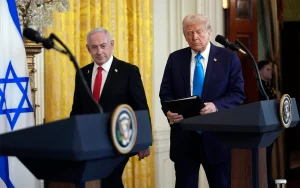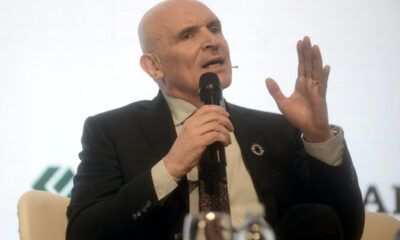INTERNACIONAL
Polish leaders celebrate Hanukkah after menorah extinguished by far-right lawmaker

- Top Polish leaders celebrated Hanukkah in parliament on Thursday, joined by members of the Jewish community.
- The celebration serves as a show of solidarity after far-right lawmaker Grzegorz Braun made international headlines for putting out the parliamentary menorah’s candles with a fire extinguisher.
- «This is the true face of Poland,» Rabbi Michael Schudrich, said. «We are all together.»
Top Polish leaders joined members of the Jewish community for a Hanukkah celebration in parliament Thursday after a far-right lawmaker used a fire extinguisher to put out burning candles on a menorah earlier this week.
The attendance of the president, speaker of parliament and other top legislative officials sent the message that there is no tolerance in Poland for the kind of antisemitic behavior that erupted in parliament halls Tuesday, shocking the country and drawing widespread condemnation across the political spectrum. A woman was injured in the incident and was still in a hospital two days later.
Rabbi Shalom Ber Stambler of the Chabad community, who has organized the Hanukkah event in parliament for the 17th straight year, said: «We will dispel darkness through light, and we are lucky that a little light can dispel a lot of darkness.»
FAR-RIGHT POLISH LAWMAKER BLASTS MENORAH WITH FIRE EXTINGUISHER
President Andrzej Duda stood by a large menorah as the parliament speaker, Szymon Holownia, lit a candle, with Jewish community members lighting the others on the eighth and last night of the Jewish festival of lights.
Duda and Holownia are among the highest leaders in Poland. The other top leader, Prime Minister Donald Tusk, was in Brussels for a European Union summit. He also strongly denounced the earlier antisemitic incident.

Polish President Andrzej Duda, second right, and Speaker of the Polish Parliament Szymon Holownia, right, re-light the menorah in Parliament. (AP Photo/Czarek Sokolowski)
«This is the true face of Poland,» the country’s U.S.-born chief rabbi, Michael Schudrich, said. «We are all together.»
Grzegorz Braun is a lawmaker on the extreme right fringe who is considered one of the most controversial officials in Poland. On Tuesday he grabbed a red fire extinguisher and extinguished candles on a menorah that were lit for Hanukkah, creating disruption and scandal as a new pro-EU government was beginning its work. A Jewish community member tried to stop him, and he reacted by spraying her with the extinguisher chemical.
Braun, a member of the Confederation party, has in the past falsely claimed there is a plot to turn Poland into a «Jewish state.» In May, he violently disrupted a lecture by a Holocaust scholar, Jan Grabowski, at the German Historical Institute in Warsaw. He grabbed the historian’s microphone and banged it on the lectern before going to a loudspeaker, hitting it and knocking it over.
He was banned from the parliament building on Thursday.
CLICK HERE TO GET THE FOX NEWS APP
Poland was once home to a large Jewish community that numbered nearly 3.5 million on the eve of the Holocaust. Almost all of Poland’s Jews were murdered by the Nazi German forces that occupied Poland in World War II.
INTERNACIONAL
The history of Gaza amid Trump’s plan to rebuild enclave

In an audacious move that stunned the world, President Donald Trump unveiled a proposal to relocate 1.8 million Palestinians from Gaza, seeking to rebuild their lives in new places. Addressing the media alongside Israeli Prime Minister Benjamin Netanyahu at the White House, Trump outlined his ambitious vision for the Gaza Strip.
«I strongly believe that the Gaza Strip, which has been a symbol of death and destruction … for so many decades—devastating for the people living there and for those anywhere near it—should not go through another cycle of rebuilding and occupation by the same people who have fought, lived, died, and suffered in that place.»
The president emphasized the importance of learning from history. «History, you know, just can’t keep repeating itself,» Trump remarked, urging a departure from the failed approaches of the past.
‘LEVEL IT’: TRUMP SAYS US WILL ‘TAKE OVER’ GAZA STRIP, REBUILD IT TO STABILIZE MIDDLE EAST
President Donald Trump, right, and Israeli Prime Minister Benjamin Netanyahu answer questions during a joint press conference in the East Room at the White House in Washington, D.C., on Feb. 4, 2025. ( REUTERS/Leah Millis)
«Dating back nearly 4,000 years, since the time of the Patriarchs Abraham & Isaac, to the time of the mighty Biblical Judge Samson and the Philistines; from the rule of Solomon and the kings of the Davidic Dynasty, and for millenia onward; the territory of modern-day Gaza has been a place of both conflict and hope, trading hands from one ruler to another, with the potential for prosperity just over the horizon, but aside from brief periods, peace for her inhabitants and neighbors remained elusive,» Ze’ev Orenstein, the director of international affairs for the City of David Foundation in Jerusalem, told Fox News Digital
The history of Gaza that Trump was referring to is both a long and tumultuous one.
Biblical Roots: A Battleground for Civilizations
Gaza’s history dates back nearly 4,000 years, frequently appearing in biblical narratives. It was one of the five key cities of the Philistines, who arrived from the Aegean, known for their clashes with the Israelites. The story of Samson, who tore down a Philistine temple, is one of the earliest recorded tales of destruction and rebuilding in Gaza. Over centuries, it was conquered by the Egyptians, Babylonians and Persians, each bringing new rulers and forcing population shifts. Even then, Gaza was a land where people came and went, often not by choice.
Ottoman Rule: A Strategic Military Outpost
Under the Ottoman Empire (1517–1917), Gaza was a military stronghold. The Ottomans used it as a buffer zone, and while some periods saw growth, it was frequently abandoned during wars. In 1799, Napoleon’s forces briefly occupied it before retreating. Once again, Gaza was left in ruins, and its population had to start over.
TRUMP EYES ABRAHAM ACCORDS EXPANSION, GAZA REBUILD WITH NETANYAHU MEETING ON DECK
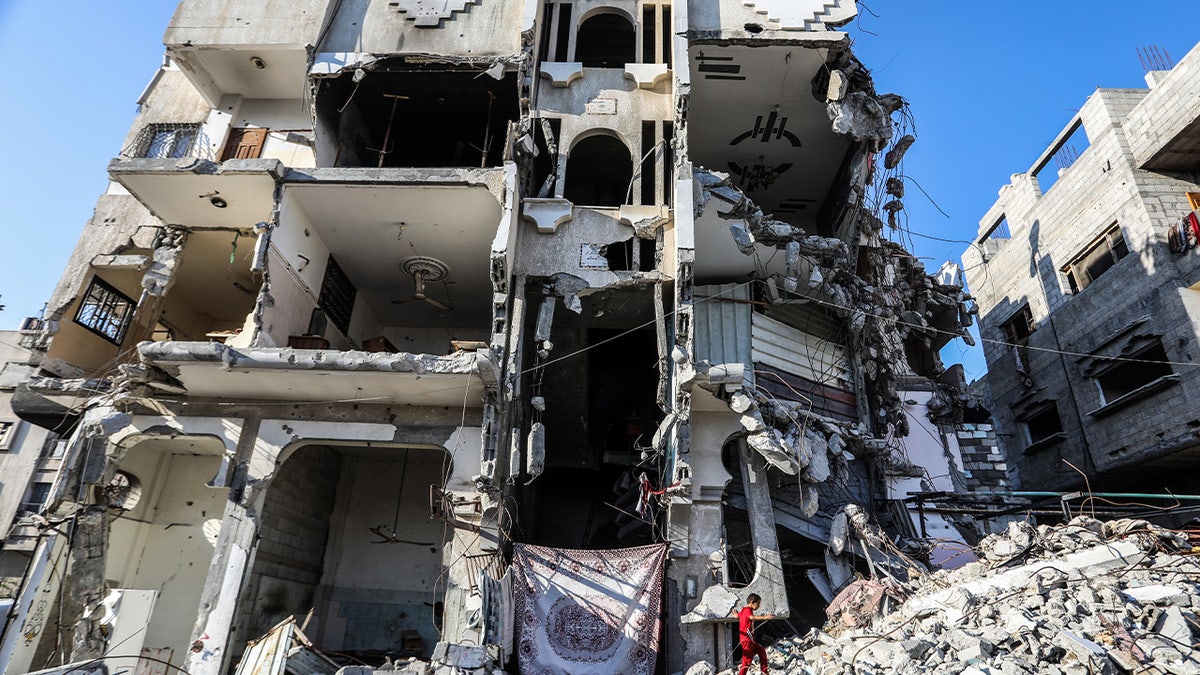
A view of destroyed buildings caused by Israeli attacks comes to surface following the withdrawal of the Israeli army in Khan Yunis, Gaza, on Sept. 29, 2024. (Abed Rahim Khatib/Anadolu via Getty Images)
The British Mandate and the First Exodus
When the British took control in 1917, Gaza became part of the British Mandate for Palestine. Tensions between Jews and Arabs escalated, leading to violent clashes. By 1948, when Israel declared independence, thousands of Palestinian refugees fled to Gaza, turning it into an overcrowded enclave under Egyptian rule.
Egyptian Rule: No Citizenship, No Stability
From 1949 to 1967, Egypt controlled Gaza but never integrated it. Palestinians living there were not granted Egyptian citizenship, and Gaza remained impoverished and politically unstable. When Israel captured it in the Six-Day War, the cycle of displacement and destruction resumed.
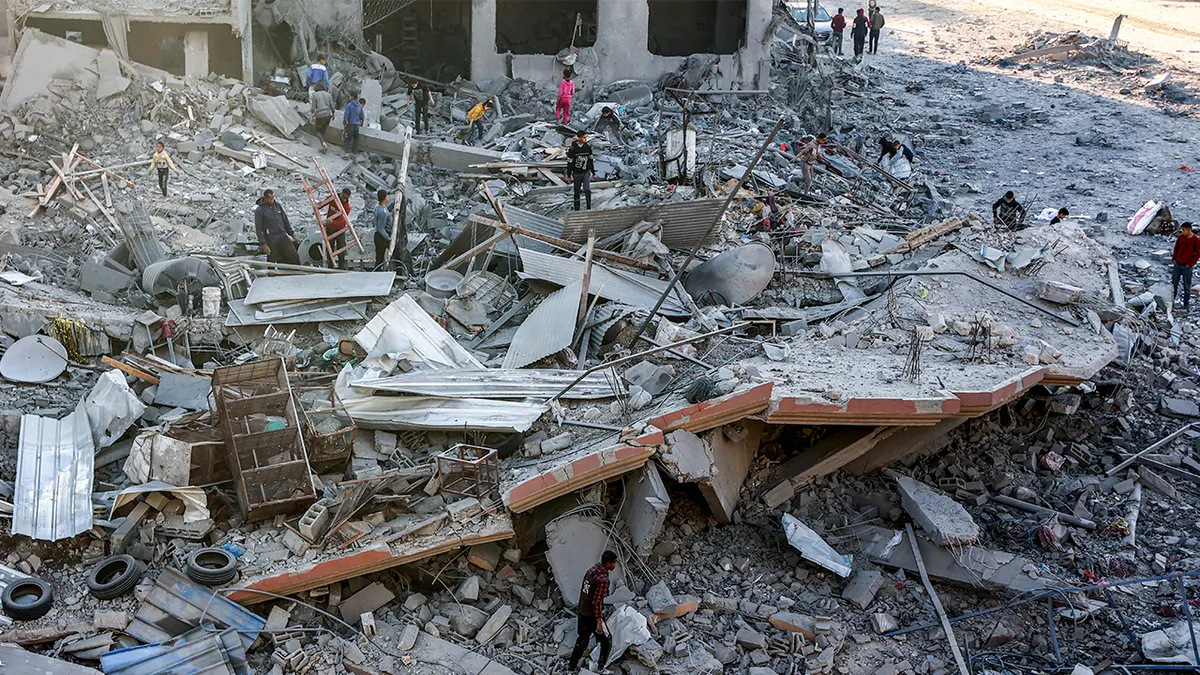
People inspect the debris and rubble at the site of Israeli bombardment on a residential block in Jalaa Street in Gaza City on Jan. 14, 2025 amid the ongoing war in the Palestinian territory between Israel and Hamas. (OMAR AL-QATTAA/AFP via Getty Images)
Israeli Rule: Settlements and Economic Integration
After Israel took over Gaza in the Six-Day War in 1967, Jewish settlements were built within the coastal enclave, creating economic interactions between the two peoples – but also increasing the level of tension.
Amir Tibon, himself a survivor of the October 7 attack, describes in his book «The Gates of Gaza,» Palestinians found out what life looked like for their Israeli neighbors, who enjoyed a significantly higher standard of living. Soon, hundreds of thousands of Gazans would enter Israel daily for work, and Gaza’s economy became tied to Israel’s, but hostility persisted. In the 1980s, the Islamist organization Hamas became a rising force among Palestinians in Gaza, eventually succeeding in taking over the enclave and turning it into a fortress of terror.
‘PEACE THROUGH STRENGTH’: TRUMP AND NETANYAHU EXPECTED TO DISCUSS IRAN, HAMAS AT WHITE HOUSE MEETING
The Palestinian Authority’s Short-Lived Rule
After the Oslo Accords, the Palestinian Authority (PA) took administrative control of Gaza in the 1990s. For the first time, there was hope for Palestinian self-rule, but corruption and internal strife plagued the PA’s governance. During the Second Intifada (2000–2005), terrorist attacks from Gaza escalated, leading to Israeli military operations that devastated the region once again.
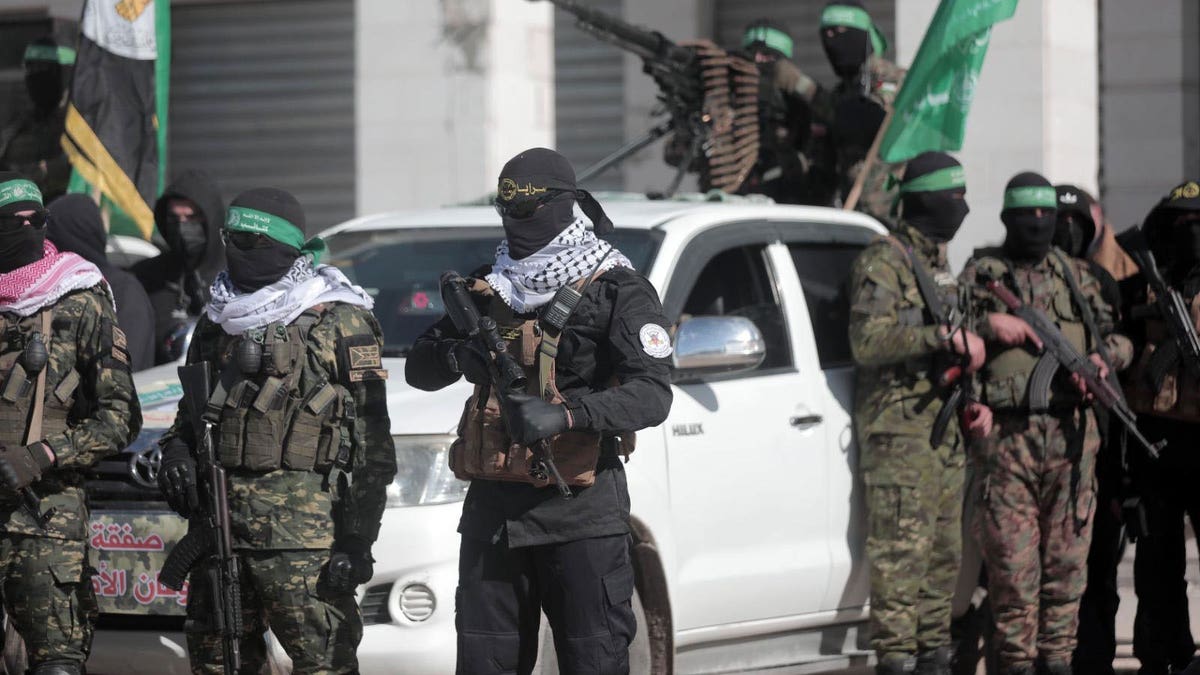
Members of the Hamas terror group gather in Gaza in preparation for the release of four female hostages as part of the ceasefire deal with Israel. (TPS-IL)
Hamas: Ruling by Force, Trapping Its People
In 2005, Israel withdrew from Gaza, removing all settlements. In 2007, elections were held, and Hamas took control, ousting the PA. Since then, Hamas has engaged in repeated attacks on Israel, leading to destruction and humanitarian crises. With Hamas prioritizing terrorism over governance, Gaza has remained in a state of war and siege. Today, it is one of the most densely populated places in the world, with 2 million residents.
Richard Goldberg, a senior adviser at the Foundation for Defense of Democracies, told Fox News Digital, «Israel withdrew unilaterally 20 years ago. Egypt wants nothing to do with Gaza. Hamas is a terrorist group, not a government. Gaza is no man’s land, with 2 million people used as political pawns instead of human beings.»
CLICK HERE TO GET THE FOX NEWS APP
A Land That Has Always Been Rebuilt
Trump’s idea of relocating Gaza’s population and rebuilding new communities echoes patterns from the past. Whether it was the Philistines, Ottomans, the British, or Egyptians, Gaza has frequently seen its population displaced, only to return or be reshaped under new rulers. While today’s political realities make mass relocation unlikely, history shows that radical shifts in Gaza’s demography are not unprecedented.
-
SOCIEDAD3 días ago
Conurbano salvaje. Hallaron muertos debajo de un puente a dos adolescentes que habían desaparecido el jueves
-
POLITICA2 días ago
Ola de calor: casi 50.000 usuarios se quedaron sin luz en el AMBA y hubo apagones en el interior
-
POLITICA2 días ago
Guillermo Francos cargó contra Kicillof tras el doble crimen de Florencio Varela: «La Provincia está incendiada por la inseguridad»
-
POLITICA22 horas ago
«Lanus en la oscuridad: Cortes de luz eternos y gestión cuestionada de Julián Álvarez»
-
POLITICA22 horas ago
El Gobierno denunció a Cristina Kirchner por cobrar en sus jubilaciones el plus por zona austral mientras reside en la Ciudad
-
POLITICA10 horas ago
José Luis Espert, polémico sobre la inseguridad: «A los chorros hay que llenarlos de agujeros y colgarlos en una plaza pública»

















